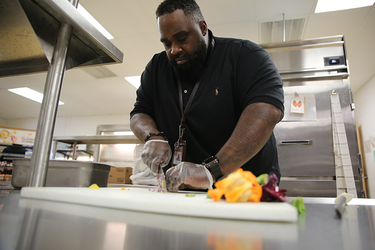Chef Clark says good meals can make a difference in students’ lives
BERNE — Lateef Clark says that preparing food has kept him grounded as a human being.
“It evolved me as a person … raised me to be a better human, a better man … just by meeting people of different diverse backgrounds and also just by cooking for people,” he says in this week’s Enterprise podcast.
Clark has worked as a chef in England, in the Virgin Islands, and in Spain — and he doesn’t go on vacations anymore; rather, he goes on “food-cations.”
He likes to research an area’s cuisine and then, when he visits there, “to eat with the natives,” says Clark.
The thrill of cooking, he says, is hearing the oohs and aahs from people who eat the food he has prepared.
“You’re as good as your last meal, and that’s what it’s about,” Clark says.
He started his food journey as a boy, learning to cook from his mother and grandmother. Although his grandmother had no formal training, Clark said, “She just picked things up …. She worked with a family who had a French chef and she learned some things doing that while she was in nursing school.”
His mother, Clark said, would try cooking a lot of different foods.
“I come from a diverse background of family members,” he said. “We always cooked … a lot of different varieties of food, whether it’s been Asian, Jewish, of course soul food, Italian, Vietnamese, Indian …. I was always brought up to try different cuisines and that’s what helped me out in my journey.”
Clark grew up in Bridgeport, Connecticut, which he described as a “diverse melting pot for food.”
As an eighth-grader, faced with deciding between going to a regular high school or a tech school, he chose a regular high school but then, after his regular classes were over, he went up the street to learn in a culinary program at the tech school.
What he discovered in the culinary program is, “This is fun,” Clark said, explaining, “I like to eat; I like to dabble.”
He went on, “I got into some trouble as a teenager and food service kept me out of trouble. Becoming a chef kept me out of trouble.”
Clark has a master’s degree in business administration and an undergraduate degree in culinary arts, as well as various certificates, licenses, and diplomas. He has worked as a culinary instructor and for nearly two decades as an executive chef.
He was on Marriott’s Operations Support Resources team, which meant being resourceful as OSR implies. “I helped open and manage the property until they got up and running,” he said.
Clark also worked for the Compass Group in the higher education sector. He became the campus executive chef at Colgate University.
“I was getting tired of the 14-hour days,” said Clark and he wanted to find a job with “some fulfillment.”
He ended up finding fulfillment as a food-services director for two school districts: Berne-Knox-Westerlo and Schoharie, working through the Board of Cooperative Educational Services.
“This has been more fulfilling to me than anything I’ve done,” said Clark of his current work. “I’m making a change, even if it’s just for that moment in a child’s life.
Clark has worked directly teaching students from both Schoharie and BKW who competed in the New York Beef Council’s annual Top Beef contest. The agriculture teachers at both those schools are friends and they each called on Clark to help their students.
For the last two years, in the statewide competition, Clark said, one school district came in first and the other came in second — both under his tutelage.
On day-to-day school meal preparation, Clark works with a BOCES dietician to make sure all the standards are met.
“We just put a creative spin on it,” he said of his work. “We try to limit ourselves from opening stuff out of a box.”
Rather, fresh ingredients are used and are assembled on site.
School kitchens he said are often “kitted out with top-of-the-line equipment, to the nines, and none of this stuff gets used. Some of this stuff becomes storage bins.”
His philosophy is: Use the equipment you have. “We have a big brazing skillet,” Clark says, giving an example, “You can do French toast, you do pancakes, you do scrambled eggs, you can do fried rice, you can do a range of different things … It’s all about making a menu around the equipment that you have.”
Sometimes Clark goes beyond what is offered in the kitchen. Last month, on a perfect spring day, he treated BKW students and staff to a luau that featured a roasted pig secured from a local vendor.
He started planning the feast over a year ago when an offhand comment was made one day when he came into the BKW school kitchen wearing a Hawaiian shirt.
“The planning process is the biggest thing,” he said. “It was just all getting everyone on board.”
His day, which usually starts at 5 a.m, started at 4. And his menu — “the whole pig seasoned to perfection with herbs and spices, slow roasted for 10 hours” — sounded like something from a five-star restaurant.
Clark conceived of the luau as a reawakening after the confinement and social distancing brought on by the pandemic. Students and teachers wore leis and a celebratory mood was in the air as well as the smell of exotic foods.
“I don’t want all the accolades,” said Clark. “I like to give that to the staff and to everyone who helped out. I just put it together and cooked.”
In an era when a lot of kids are depressed or anxious, Clark says, good meals can make a difference in their lives.
“I try to make these kids have a memorable experience,” he says, “just by providing a great meal and a great experience every day.”



